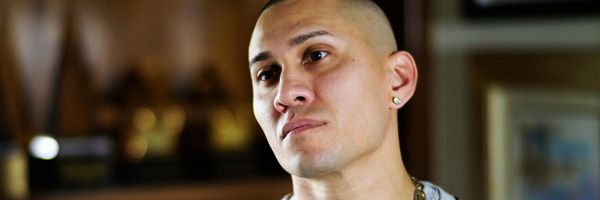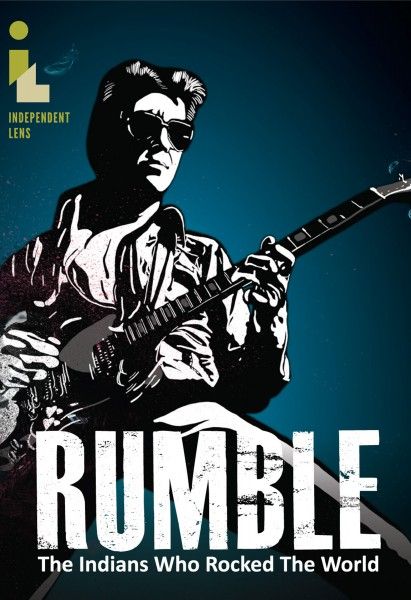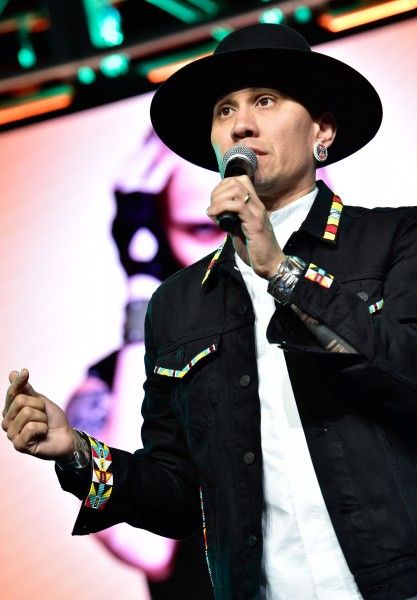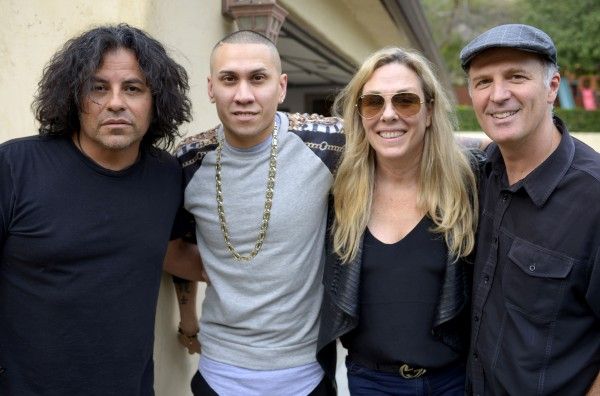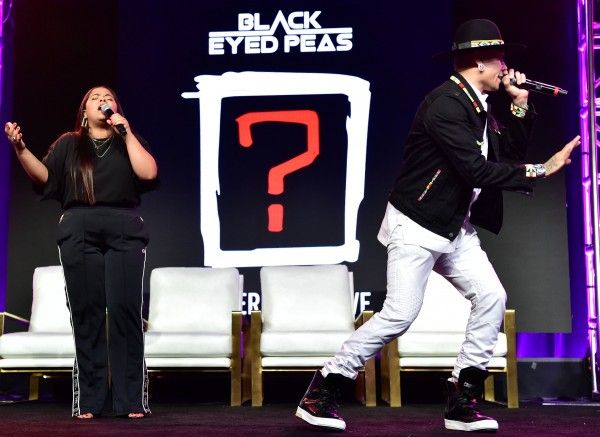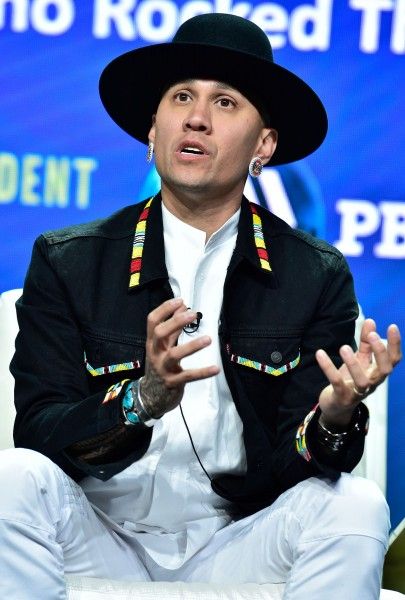Rumble: The Indians Who Rocked the World (premiering on Independent Lens on PBS on January 21st, and also available simultaneously for online streaming at www.pbs.org is a documentary that explores how Native American musicians transformed blues, jazz and rock, with stories that are told by some of the music legends who knew them, played with them and were inspired by them. From the Native and African American roots in the early pioneers of the blues, to one of the first and most influential jazz singers who was trained on Native American songs, to the Native American folk rockers in the ‘60s and ‘70s, to a variety of Native guitarists and drummers that changed rock and roll, the influence was both vast and wide.
During this 1-on-1 interview with Collider, Jimmy Luis Gomez, aka Taboo of the Black Eyed Peas (who is of Shoshone and Mexican descent), talked about how he got involved in the documentary, his desire to learn more about the cultures that make up his heritage, honoring culture without appropriating it, the importance of being socially and culturally aware, embracing what it means to be Mexican and Native American, how it’s changed his perception of himself, how battling and beating cancer has changed his life, what the Black Eyed Peas mean to him, and what it’s like to have a Marvel comic in their likeness.
Collider: How did you come to be a part of this documentary?
TABOO: I met Stevie Salas through my journey, probably 10 or 11 years ago. He was doing a Smithsonian Native Exhibit, and he wanted to talk about Native Americans in the music industry. He came to me and was like, “Are you down to do some thing about your culture?” And I was like, “Man, I want to learn more about my culture because I’m an L.A. kid, and I know that I have Native American roots because of my grandmother and I know that I’m also Mexican because of my grandfather, but I want to learn more about where I came from.” He was like, “Dude, I’ll show you the ropes. I’ll introduce you to the right people, so that you can understand the beauty of Indian Country.” After that point, he became a mentor and he talked to me about the possibility of turning that exhibit into an actual movie. From that exhibit, Rumble started happening. We took the idea of exhibiting Native Americans in the music industry, who have affected change and brought inspiration through music, and turned it into a movie. That’s why, in the movie, I talk about my grandmother being my connection and not really knowing where this pull was coming from. There was a pull and a calling that was leading me on this journey. In the last 10 or 11 years, I’ve really been focusing on understanding my culture, and not being embarrassed or ashamed to say, “I don’t know everything about being Native.” That’s the vulnerable side, letting go of inhibitions and allowing myself to be a student of culture and really wanting to learn.
That’s cool because you can learn about the history of the culture in music, but also bring it to audiences who aren’t familiar with the impact that it’s had.
TABOO: Exactly. And with Black Eyed Peas, I’ve always been part of an international family. The Peas have toured around the world. When we took that hiatus, I really focused on going back into my backyard, metaphorically, which is understanding, as a leader and as a person that wants to educate myself, so I can, in turn, educate my kids about our culture. When I went to Standing Rock, it opened my mind, as did going to Indian reservations and speaking to kids about music and arts. Those are the things that shape and mold my journey, and I’m still on that journey because now I have other artists that I’m working with that are Native, that I’m gonna bring to the masses. It’s powerful when you’re able to celebrate your culture, but also bring the arts and music to the masses. I want to be respectful and empathetic about the traditions and cultures, and not have any cultural appropriation because you have to be respectful about certain things, but also educate people about North American natives and South American indigenous folks, and just celebrating indigenous people around the world.
Black Eyed Peas have always felt like a very socially aware group, but now you can also be culturally aware.
TABOO: Yeah, and it’s the best representation of our background. Apl, my bandmate, is from the Philippines. He came to America in 1989, and the first person he met was Will.i.am. And then, I met them when we were 17. Our common ground was music. Music, hip-hop, dancing, and wanting to travel the world and create music for the world was the common ground. It started with that, but we’ve always been about empowering our communities. We’ve always been about philanthropy, and trying to inspire kids to hold onto their dreams and aspirations. Our first major hit was “Where Is the Love.” That was what best represented us bringing people together, no matter what walk of life, and no matter what culture or creed. We just wanted to show that the love was always with our friendship, and that we could, in turn, bring the world together through music. The Peas wanted to travel the world and learn about different cultures, different backgrounds, different types of foods and different types of traditions, and we wanted to apply that to our music. We got inspired by Brazil and Brazilians sounds. We got inspired by rock. We got inspired by hip-hop and soul. There’s even some Native chanting in some of our previous work. We got inspired by Latin America and Mexico. We put all of those influences into our music, so that we can create a gumbo of inspiration.
It’s interesting how other cultures can feel so foreign to people, but if you connect them through music, everybody understands that.
TABOO: It’s true. The person that taught me to hold onto my dreams and aspirations was my grandmother, a strong Native woman. She said, “You can become anything you want to become because you hold onto those dreams and aspirations. Whatever you want to do in life, go after it.” At five, I wanted to be an entertainer, and I wanted to be the best dancer. I would dance in her living room, and that happiness and joy that she exuded was the thing that led me to say, “Wow, I could actually do this and maybe give more people happiness and joy.” That was a snowball effect for my motivation to be the person that I am today.
What did talking to your grandmother teach you about her, and then how did that change your perception about yourself?
TABOO: My grandmother was a warrior. She had a cane because she had a bad leg, but when she would step on the dance floor, she would throw her cane and forget about being hurt. It was like her saying, “Nothing is gonna stop me from dancing right now, not even this leg that’s not working too well. Look at me, I can still get on the dance floor and move.” That fire that my grandmother had on the dance floor is what I took with me, and I still have with me, when I’m on stage, performing. No matter what type off setting or demographic it is, I’m always there to rock and make sure that I’m giving it 150,000%. No matter if I’m sick, I’m gonna kill it because my grandmother used to step on that dance floor and kill it. That taught me the “never say die” mentality, even when I had cancer. I’m a cancer survivor. There was some times when I had to perform at cancer events, and I was still doing chemotherapy. I would feel drained and fatigued, but when I would step on stage, I would forget about it. That was my grandmother. It sounds deep, but it’s my fuel because my grandmother is always with me. She leads me on this path and this journey that I’ve been on. My grandmother has been my guide through this healing process.
What’s it been like to find a balance between your two cultures – Native American and Mexican – and embrace both of those things?
TABOO: That’s a great question. It’s been really hard because, growing up in East Los Angeles, you’re in a predominantly Mexican community. If you don’t speak Spanish correctly, or Spanish is not your first language, sometimes you’ll get criticized by the Mexican community who says, “Oh, you’re not Mexican enough,” or “You’re Americanized.” There’s that instant battle. Then, on the other end, I wanted to find out about my Native roots and be vulnerable enough to say, “I don’t know everything about being Native, but I want to learn.” A lot of times, you’ll get people from Indian Country saying, “Oh, he’s not a real Native. He’s not Indian. He wasn’t born on a reservation. He’s just wearing a hat and has beadwork, but he doesn’t know what it’s like and he doesn’t know the struggles that we’ve had to face.” It’s a catch-22. You’re damned if you do, and you’re damned if you don’t. I try to celebrate both cultures and have a balance, but the reality is that I’m proud of my grandmother and her teachings and the way that she brought me up, and I’m proud of my grandfather for coming from Mexico and having the American dream and wanting to give my mom, my uncle and my grandmother a better life. My grandmother is from Jerome, Arizona. As a Native American woman, she met this Mexican man from Mexico, and they wanted to give their kids a better life. That’s why I feel like I’m connected to the indigenous philosophy of both Native American and Mexican indigenous folks. There’s nobody in pop culture that’s really championing that, so I’ll take on that responsibility. I like to call myself the P. Diddy of the Native American world because there’s no company that could facilitate that to bring that to the masses, holding onto the integrity and the respect of the culture without having to bastardize or slander or cheapen the culture. I’m not selling that. I’m selling music and artists. I want to show their talent first, and show the music and the quality of the production, before you then find out that they’re Native American kids from the reservation.
After taking a break, how does it feel when you work with the Black Eyes Peas now? Does it feel different?
TABOO: It does feel different because I’m alive. You’ve gotta understand, when you’re faced with the mortality of battling a serious disease like cancer, I was doing chemo five days a week, six hours a day, and there were moments where I really wanted to give up. I was like, “I’m not doing this anymore. I’m done.” The mental trauma that I was going through, and the internal trauma from the chemo, was difficult. The automatic thing was thinking about my wife and my kids, which kept me fighting and kept me going. My grandmother was there with me, with her warrior spirit. Another thing that kept me fighting was knowing that I could be back on stage with my best friends again, performing for the world and giving people an hour or two of therapy through music and good times. I needed that in my life and I was lacking that, so I would watch some of the videos that we’ve done, whether it was in Mexico or South America or the Philippines. The joy that we had, laughing, smiling and performing, and performing “Where is the Love” and seeing all of the lights in the air, made me feel like, “I’m gonna be on that stage again. I’m gonna fight this. I’m gonna beat this cancer, and I’m gonna be back on that big stage.” Although I was battling this horrible disease, I was gonna battle through the crowd to center stage. That was my mentality. So, I’m excited that I’m alive. I’m overwhelmed because we’ve been a group since 1995, and over 20 years later, we’re still able to do it.
You can really tell when somebody loves what they’re doing or when they’re faking it, and you can tell that you guys really love each other. That’s a beautiful thing.
TABOO: It is. It’s awesome. We have the best fans. We call them Pea-bodies. They’ve been with us, since the beginning. They keep us wanting to give great content and do great things, as a group, but also individually, whether we’re doing activism work, or inspirational work in communities where we can be of service. Apl is doing a lot of stuff in the Philippines. Will.i.am is doing a lot off stuff with the STEM program – science, technology, engineering and math. I’m doing stuff in the cancer space, but also in Indian Country. Those things keep us fueled. Even though we didn’t have any music as Black Eyed Peas, we were still doing our work, and they followed us through that journey, as well.
As a lover of pop culture, is it also cool to have a Marvel comic of you?
TABOO: Yes! That is so epic. I was a fan at Comic-Con, and that’s how I made the connection with Marvel, prior to Will.i.am showing me this possibility. It was a thought that he and the writers and illustrators had created, and then, because of Comic-Con, my connection with Marvel was something that I held on to. I wasn’t going to step to Marvel with an idea that wasn’t flushed out. When I said, “Hey, Will, let’s take this to Marvel,” he was like, “Tab, seriously? Marvel?! They’re not gonna mess with us.” I was like, “Will, I beat cancer, bro. Anything is possible!” He was like, “You’re right, Tab. Okay, cool, set up the meeting.” So, we set up the meeting and we brought them the IP, and they were blown away. They were like, “We love this,” so we collaborated with Marvel. We went back to Comic-Con, to the Marvel booth, and we had our own after-party.
Rumble: The Indians Who Rocked the World airs on PBS on Monday, January 21st.

